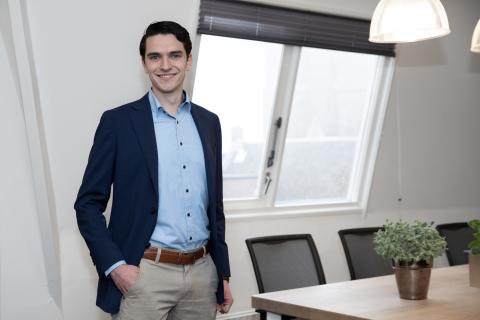
This time in ''In the spotlight'' colleague Ragnar Klabbers explains where his fascination for logistics comes from. Ragnar has been part of the Districon Supply Chain team for 2 years.
Who are you?
My name is Ragnar Klabbers and for almost 2 years I have been a supply chain consultant at Districon. In this relative short timespan, I have worked for clients ranging from the food sector to the public sector. Although I feel that I have had a steep learning curve, I also experienced that there is so much more to learn.
My experiences
Since I was a little boy I was fascinated by trucks, ships, big machinery and how to make and move stuff around in general. Whether I was watching the garbage truck from behind the living room window or looking at container ships on the discovery channel, I was fascinated. A little more than a decade later I signed at Districon, fully ready to work on improving processes, flows and work on how to improve, move and produce “stuff” (young me would be proud).
In my short experience at Districon the most valuable lesson I learned is that the impact a consultant makes can be felt in an entire company, even though you are not always able to see the impact. This can make or break your project. In most large organizations, it is hard to look past certain boundaries and thus cannot see the effect of our actions behind our own horizon. During my experience at a factory in the food sector I was fortunate enough to experience the impact of reduced stock levels and its effect throughout the entire factory. Our mission was to reduce working capital stuck in trade goods. We would do this by the classic approach: stock reduction, an increase in production intervals and reduced batch sizes. This approach is effective but puts a strain on the entire organization. The purchase department is stretched since they must order smaller amounts of product at higher intervals, forecasting must be improved since there is a smaller error margin to compensate for deviances in demand. At the same time production faces more product changes, and lower volumes per production run.
In this type of project, you want to keep in touch with the different departments to monitor improvements and risks, whilst being able to act on new situations. I learned there is a fragile balance between maximum rate of improvement and overstretching the change. The first is efficient the latter harmful.
Vision for the future
We cannot go around the impact of the corona virus. Our clients face large shifts in demand (both up and down). Traditionally we would be ready to help our clients accommodate both growth and decline in demand (we need to keep doing this). However, the real challenge is how to improve flows whilst changing to green and environmentally friendly ways of operation in these tough times. This is, in my opinion, the main challenge and I am thrilled to be able to contribute to this ambition together with my colleagues.
Which colleague will be in the spotlight next?
I would like to nominate Rob Strijbosch for the next spotlight. Rob is our financial controller and fulfills a vital function in our company. Rob, I am curious to hear your story.
